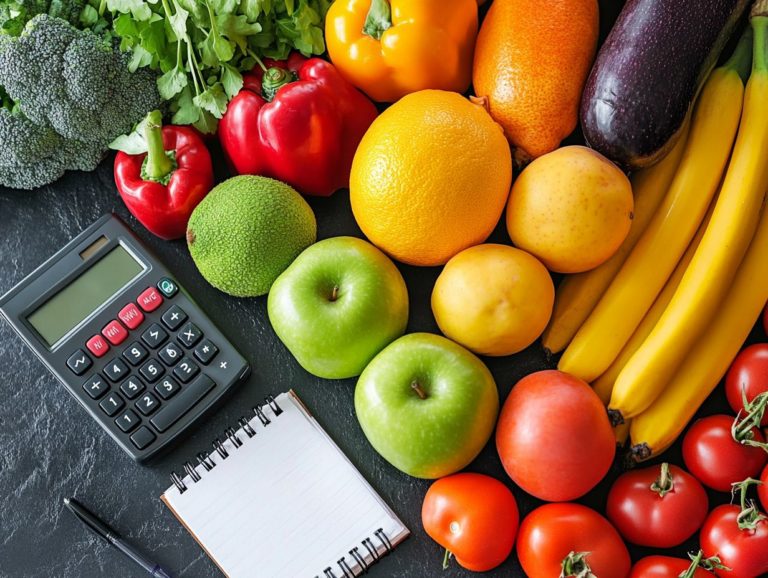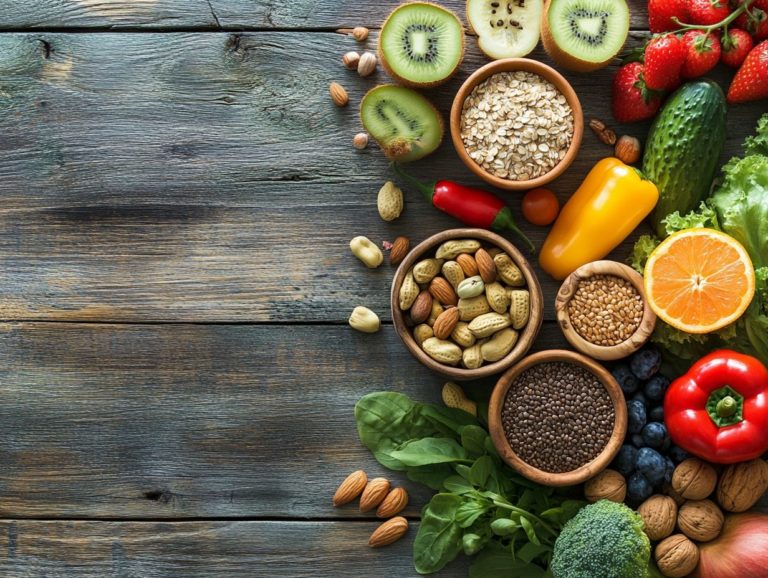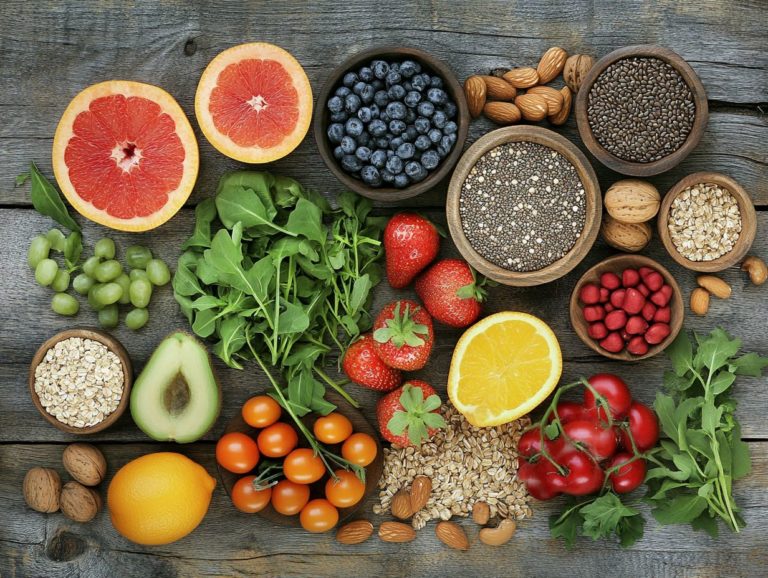How to Educate Yourself About Nutrition?
Nutrition is key to feeling great, but with so much information available, it can be overwhelming. This article delves into the significance of nutrition education and presents effective strategies to deepen your understanding whether through reputable online resources, insightful books, or expert consultations with nutritionists. By the end of this article, you’ll be equipped to take control of your health starting today!
Contents
- Key Takeaways:
- The Importance of Nutrition Education
- Ways to Educate Yourself About Nutrition
- Evaluating Nutrition Information
- Incorporating Nutrition Education into Daily Life
- Benefits of Continuing Nutrition Education
- Frequently Asked Questions About Nutrition
- What is nutrition and why is it important to educate myself about it?
- Where can I find reliable sources to educate myself about nutrition?
- How can I start educating myself about nutrition?
- What are some common misconceptions about nutrition that I should be aware of?
- How can I educate myself about nutrition on a budget?
- What are some simple steps I can take to improve my nutrition knowledge?
Key Takeaways:

- Learn the role of nutrition in keeping you healthy.
- Use online resources and talk to nutritionists for better understanding.
- Always check the reliability of your nutrition information.
The Importance of Nutrition Education
Nutrition education is essential for cultivating a healthy lifestyle, especially given the rising rates of chronic diseases like heart disease, diabetes, and cancer. It equips you with the knowledge needed to make informed dietary choices, decipher food labels, and utilize community resources that encourage healthy eating.
Connecting with registered dietitians and attending nutrition workshops helps you understand concepts like nutrients in your food, balanced diets, and the significance of whole foods for your overall well-being.
Understanding the Role of Nutrition in Overall Health
Understanding how your food choices affect your health is vital. Knowing about macronutrients proteins, fats, and carbohydrates (the three main types of nutrients) makes it clearer. Emphasizing nutrients in your food ensures that every meal is packed with essential vitamins and minerals, which are crucial for energy levels, immune support, and overall vitality.
Dietary diversity enriches your culinary experience, offering a broad spectrum of flavors and nutrients while guarding against deficiencies. Engaging in food education gives you the power to comprehend your nutritional needs better, enabling you to make informed choices that lead to a healthier, more vibrant life.
Ways to Educate Yourself About Nutrition
You have a wealth of options at your fingertips to deepen your understanding of nutrition. Consider exploring online resources, connecting with registered dietitians, or participating in nutrition workshops. Each of these avenues offers valuable insights for your journey to better health.
Online Resources and Courses
Online resources and courses present you with exceptional opportunities to elevate your nutrition education. By exploring a variety of platforms, such as interactive webinars and dynamic online courses, you can immerse yourself in the fascinating world of nutrition. These resources equip you with extensive knowledge on healthy eating habits and offer practical tips for meal preparation that are easily actionable.
Whether you re mastering the art of creating balanced plates or uncovering the nutritional value of various foods, hands-on experiences and expert insights significantly enhance your journey. This holistic approach nurtures a deeper understanding of dietary choices. Join the community of health-conscious individuals and start your journey to a healthier life now!
Books and Publications

Books and publications are great resources to expand your knowledge on nutrition education and grasp the fundamentals of a healthy diet. These materials not only deliver essential information but also inspire you to understand the essentials of nutrition education and cultivate better eating habits.
Take, for instance, titles like *The Omnivore’s Dilemma* by Michael Pollan and *How Not to Die* by Dr. Michael Greger. These works delve deep into the connections between your food choices and overall health. They explore the science behind nutrition and provide practical tips, empowering you to make informed decisions.
Publications like *Nutrition Reviews* keep you updated on the latest research findings, ensuring you stay informed on trends and discoveries in the nutrition field. Both foundational books and cutting-edge research are critical in enhancing your understanding and promoting a healthier lifestyle.
Consulting with a Nutritionist
Consulting with a registered dietitian is one of the most effective ways to receive personalized nutrition education and support to make sustainable changes in your life.
This professional guidance helps you understand the many dietary choices available, offering tailored meal plans that fit your lifestyle and preferences. By assessing your specific health goals and challenges, a nutritionist can help you craft strategies for healthier decision-making, potentially leading to significant improvements in your well-being.
They provide invaluable insights into understanding food labels, portion sizes, and the right mix of vitamins and minerals, guiding you toward a clearer path to mindful eating. With their support, overcoming barriers to healthy eating becomes much more manageable, ultimately nurturing a positive relationship with food that fosters lasting lifestyle changes.
Evaluating Nutrition Information
Evaluating nutrition information is crucial for making informed dietary choices. This process allows you to discern reliable sources from the sea of misinformation that often clouds the wellness landscape.
By honing this skill, you empower yourself to navigate your nutritional journey with confidence and clarity.
How to Identify Reliable Sources
Identifying reliable sources of nutrition education is essential to acquire accurate information and make informed decisions about your food choices.
To distinguish credible resources, focus on studies published in reputable, peer-reviewed journals, where experts review studies to ensure accuracy. Consulting established organizations, such as the Academy of Nutrition and Dietetics or the World Health Organization, can provide you with reputable guidelines and insights. You can also seek expert opinions from registered dietitians those with accredited qualifications to further enhance your understanding.
Consider looking into books like “The Nutrition Crime” by Dr. John Berardi or exploring the nutrition section of the Harvard T.H. Chan School of Public Health s website. Both uphold high standards of accuracy and reliability in dietary guidance, ensuring you have access to the best information available.
Incorporating Nutrition Education into Daily Life
Incorporating nutrition education into your daily life requires a thoughtful approach with practical tips and strategies designed to elevate your eating habits.
It’s about fostering a lifestyle where healthy and mindful eating becomes second nature. Transforming your eating habits can be exciting! Start making small, practical changes, and soon healthy eating will feel natural.
Practical Tips and Strategies

Practical tips and strategies for healthy eating can elevate your nutrition education journey and foster lasting dietary changes.
By crafting balanced meal plans that feature a variety of healthy foods packed with nutrients, you can effortlessly meet your dietary needs. For example, blending leafy greens like spinach or kale into your smoothies offers a delightful way to boost your vegetable intake while keeping the taste enjoyable.
Using cooking resources such as meal prep websites or apps streamlines the process, making it simpler for you to whip up wholesome meals at home. Meal prep means preparing meals in advance to save time.
Creating a positive environment helps reinforce healthy eating habits. Involving family members or planning meals with friends can create a sense of accountability and motivation that keeps you on track.
Incorporating foods like quinoa, beans, and a vibrant assortment of fruits enhances flavor and helps sustain your energy levels throughout the day.
Benefits of Continuing Nutrition Education
Continuing your nutrition education brings a wealth of benefits, giving you the power to make informed choices that enhance your healthy lifestyle and significantly lower your risk of chronic diseases.
Staying Informed and Making Informed Choices
Staying informed about nutrition education gives you the power to make choices that genuinely support a healthy diet and enhance your overall well-being.
This pursuit of knowledge is exciting and crucial for your health! Nutritional science, the study of how food affects our health, is always evolving, and fresh research continuously reveals new insights about how various foods impact health.
By actively seeking updates from credible sources such as registered dietitians, peer-reviewed journals, and reputable health organizations you can navigate the confusing maze of dietary information with greater confidence.
Participating in workshops, webinars, or community nutrition programs further enriches your understanding. Reviewing and improving your dietary habits means ensuring that your food choices align with your personal health goals and are rooted in the latest scientific discoveries.
Frequently Asked Questions About Nutrition
What is nutrition and why is it important to educate myself about it?
Nutrition is the process of providing our bodies with the necessary nutrients for growth, development, and maintenance. It is important to educate yourself about nutrition because it directly affects our overall health and well-being. By understanding nutrition, we can make informed choices about what we eat and how it impacts our bodies.
Where can I find reliable sources to educate myself about nutrition?

There are many reputable sources for nutrition information, such as government websites, registered dietitians, nutritionists, and scientific journals. It is important to fact-check information and stick to evidence-based sources for accurate and reliable information.
How can I start educating myself about nutrition?
There are several ways to start learning about nutrition. You can enroll in a nutrition course, attend seminars or workshops, read books or articles written by experts, or consult with a registered dietitian or nutritionist. Additionally, you can explore how to understand nutrition science to deepen your knowledge. You can also start by making small changes to your diet and observing how it affects your body.
What are some common misconceptions about nutrition that I should be aware of?
There are many myths and misconceptions about nutrition, such as the idea that all fats are bad or that carbs should be completely eliminated from your diet. It is important to educate yourself and be aware of these misconceptions so you can make informed decisions about your diet.
How can I educate myself about nutrition on a budget?
There are many affordable options for learning about nutrition, such as borrowing books from the library, finding free online resources, or attending community events on nutrition. You can also meal plan and cook at home to save money on processed and unhealthy foods.
Start your nutrition journey today! Empower yourself with knowledge and make positive changes for a healthier life.
What are some simple steps I can take to improve my nutrition knowledge?
Start by reading nutrition labels on food products. Pay attention to portion sizes and the types of nutrients in what you eat.
Try experimenting with new healthy recipes. You can also seek advice from a nutrition expert for personalized recommendations.
Take these steps today and enhance your nutrition knowledge!






